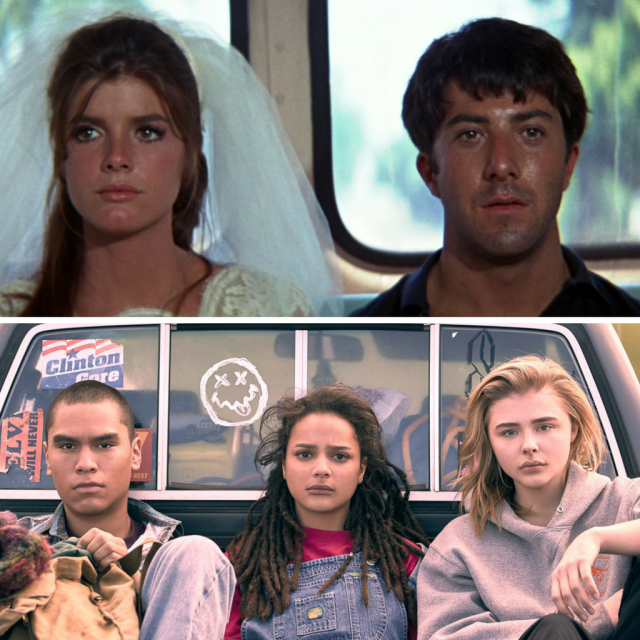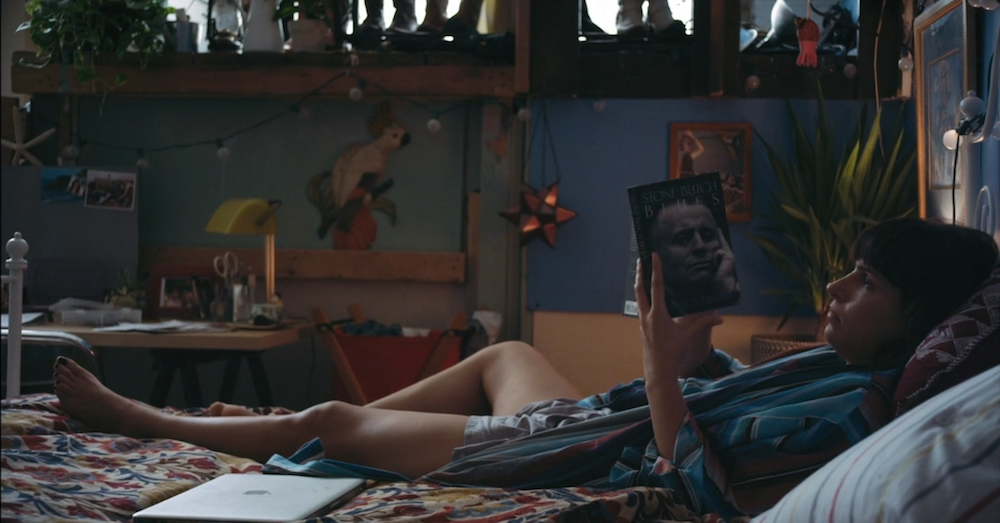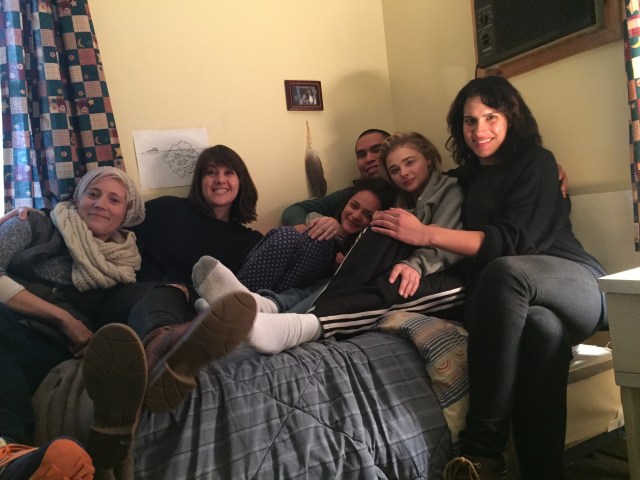Featured image courtesy of Variety.
emily m. danforth’s The Miseducation of Cameron Post is a book obsessed with the movies: Personal Best and The Hunger. Elizabeth Taylor’s gasps and Dracula’s thick accent. Even a Christian aerobics videocassette is worth the time of day. To witness Cameron come to life in her very own film — to be able to look at this gay girl from Montana who made a personal brand out of looking — is an endless treat. The adaptation, directed by Desiree Akhavan (Appropriate Behavior) and co-written by Akhavan and producer Cecilia Frugiuele, premiered at Sundance this January.
Here’s how it goes: It’s 1993 and Cameron (Chloë Moretz) has been shipped off to a conversion therapy camp called God’s Promise after she’s caught with a girl from her Bible study group, Coley (Quinn Shephard). Yanked away from everything she holds dear — a beloved copy of The Breeders’ Last Splash included — Cameron approaches “treatment” with mixed feelings and finds chosen family in hippie Jane Fonda (Sasha Lane) and two-spirit Adam Red Eagle (Forrest Goodluck), two God’s Promise residents who know how to score pot and meet the farcical program’s requirements with minimal effort and maximum self-preservation. Cameron, Jane, and Adam are a motley crew, worlds away from the promenade of high school hallways. But to viewers, they couldn’t seem more cool, delivering verbal comebacks and making moves we wish we could were we in their place.
I never want to relive high school or even revisit it undercover like Drew Barrymore in Never Been Kissed, but Cameron Post’s honest, good-humored approach to first love, religious hypocrisy, and the adolescent struggle against adult totalitarianism made me swoon and feel something resembling nostalgia. Despite the serious subject matter, Cameron Post marks the first time I’ve seen a feature film about a band of queer teens that’s felt wholly sincere and unfettered.
For filmmakers, the Sundance equivalent of God’s Promise is probably the Filmmaker Co-Op’s Media Room on Main Street in Park City, Utah. For every twenty-minute conversation a director has with a journalist that validates her creative choices in the Co-Op’s soundproof glass press rooms, there might be two where she’s urged to stop what she’s been doing and repent for their cinematic sins, whatever they may be. The afternoon after Cameron Post’s big reveal and the film’s premiere party — where the cast, crew, and their admirers danced to 4 Non-Blondes into the wee hours — the director, navigating a seven hour-time difference via her London home base, was totally lucid and down to talk about making Cameron.
It all started in 2012, when Akhavan scored a copy of Cameron Post before it went to press. “When my girlfriend at the time and I first read the book, we loved it. We were obsessed with it and gave it to anybody we met,” she said. “Whether it was a birthday or a holiday: ‘Read this, please, you’re gonna love it.’ Because it was the first honest depiction of growing up gay that felt really human, funny, and not like taking your medicine.”
The admiration was mutual: danforth was a big fan of The Slope, the wry web series that Akhavan co-created with then-girlfriend Ingrid Jungermann (Women Who Kill) in 2010. “Desi first reached out to me about Cameron way back before it was even published,” emily said. “She emailed a really lovely note …so we just exchanged our little fan letters back and forth and then we met up a few times in the years after.”
After Akhavan’s first feature, Appropriate Behavior, premiered to critical acclaim at Sundance, she gave danforth a holler. “Summer of 2014, I think, when she was making the rounds and trying to figure out what project to do next, she reached out again. We had a long phone call during which she more formally expressed her interest in adapting the novel. I remember pacing around our backyard for an hour or so, talking with her and just being so excited about her interest and ideas. And right from the start, before any official option agreement was in place or she and Cecilia had started writing any of the screenplay, it was pretty clear that they’d be focusing on Cam’s time at God’s Promise, which is really only the final third of the novel. But, I mean, this is something we talked a lot about and I was clear about from the jump. It’s a huge book and they were planning to make a 90-minute film, so obviously many things were going to have to be cut.”
“My girlfriend and I would play that game of, ‘Okay, if this were a movie, what would it be?’ It was definitely God’s Promise, no doubt,” Akhavan said. At nearly 500 pages, the novel’s considerably long for young adult fiction. The book’s first two sections indulge in the idle days of youth when the hands on the clock might move more than the body, but the mind roams the most. It’s only in the third section that sudden, course-altering changes are made, and Cameron is sent away to reparative therapy. “For this story to shine, it needs to be about one particular moment and one particular battle. For me, that was Cameron going into God’s Promise having a sense of who she is and then having to question that; what does that do to her? And what does meeting other gay kids do to her?” Akhavan said. “There’s so much beauty, good intention, and kindness, but I really wanted to reflect the ugliness in the book and how honest it felt and how …real.”
I mentioned to her that, while danforth’s novel received a starred review in Publishers Weekly and spoke to those who were no strangers to being gay in small places, a handful of readers still found the book’s final pages too grim. For them, the novel was a dismal portrait of queer life that debuted at a time when LGBT Americans seemed to be urging one another to maintain optimism and resilience; big gay rights were on the way! “Throughout this book there just isn’t any hope, no understanding, no outside support. Nothing,” one reader remarked. “…all we really want is a good lesbian love story!” bemoaned another.
Given her movie’s focus on the most challenging stage of Cameron’s life, I asked Akhavan if she’s concerned about receiving similar feedback about her film; she didn’t need to think twice. “No, those people are fucking pussies,” she said. “A lot of the time when you have marginalized characters — like queers and people of color—in books and films, they’re treated so preciously and they’re martyrs. I didn’t want her to be a martyr; Cameron’s never that in the book.”
If we want to get technical, there are two disparate groups of “pussies” who’ll find solidarity in their distaste for The Miseducation of Cameron Post adaptation: 1.) Those mentioned above and 2.) the chaste institutions like the Cape Henlopen School Board in Massachusetts, which gave the novel a cursory glance in 2014 and deemed it “not appropriate” for the young readers they insisted upon keeping innocent, pure, and …completely inept. Luckily for Cameron, the best queer narratives always seem to simultaneously ruffle the feathers of liberal contentment and conservative values.
Akhavan’s earnest story of queer subversion opens with a montage of a familiar heterosexual ritual: the big-haired, long-lashed, corsaged rite of passage known as prom, circa 1993. Cameron humors her Aunt Ruth (Kerry Butler), allowing herself to be preened to the nines and only wiping away the excess makeup when her guardian turns away. Cameron is an emotionally intelligent Midwestern kid with manners; manners that prevent feelings from being hurt, that evade unwanted attention, and permit her to attend prom in closer proximity to Coley than her male date — until, later that evening, he opens the car door and Cameron spills out with the girl on top of her. Chloë Moretz’ performance is dynamic in a way I wasn’t fully prepared for. Her Cameron is carefree one moment, handsome the next, and totally gutting upon her realization that unconditional love isn’t.
It’s on this note that Cameron is expedited to God’s Promise, where Jane Fonda immediately introduces herself by snapping Cameron’s photo. The Polaroid is meant to be something Cameron can reference throughout her conversion to see how far she’s come since that first miserable day — and she does, but mostly to assess the gradual fading of her heartbreak, not her same-sex attraction (or “SSA,” as the God’s Promise residents call it). Dr. Lydia Marsh (Jennifer Ehle) and her test subject/brother Reverend Rick (John Gallagher Jr.) lead the campaign against homosexuality and gender transgression with a mix of selective Bible study, group therapy, and pointless worksheets. Cameron manages to eke by, attributing her SSA to varsity sports. Her peers — especially those who believe they can change, give everything, and fail miserably — face far worse fates than Marsh’s ice queen glares and soggy cereal for breakfast.
Given the subject matter, comparisons between Jamie Babbit’s 1999 comedy But I’m a Cheerleader and The Miseducation of Cameron Post are inevitable, despite the films being really different in color palette, style, and tone. The only ‘camp’ in Cameron Post is God’s Promise; that desolate strip of cabins far removed from the gentler world for which Cameron, Jane, and Adam ache. There’s no RuPaul in baby blue hot pants, no nearby gay bar for them to sneak into like Natasha Lyonne’s Megan and Clea Duvall’s Graham. Their escape is modest, arriving in the form of a truck heading in an unknown but hopeful direction, The Graduate-style.

The comparisons between Cheerleader and Cameron aren’t useless, though. They open up the door to assessing how things have both changed and remained the same for queer youth and the filmmakers who try to do them justice. Twenty years ago, Megan was sent to conversion therapy for exhibiting cultural symptoms of lesbianism (owning a Melissa Etheridge poster, etc.) rather than actually sleeping with girls. In classic teen romance style, she’s kept virginal until deflowering suits the narrative arc — and even then, Megan and Graham keep their clothes on. Knowing what it was up against, Cheerleader wisely elected to laugh through the tears rather than harshly indict the “pray away the gay” adults who caused the waterworks in the first place. And yet: the director was still punished. Babbit went through hell to secure an R-rating for her film. And while the MPAA demanded that she cut Natasha Lyonne’s tame masturbation scene, they permitted Jason Biggs fucking apple pies in theaters across the Bible Belt.
In 2018, Cameron is able to say in deadpan what Cheerleader had to veil with smart humor in 1999. As we see in the prom sequence and her flashbacks to hooking up with Coley the first time, there’s no denying Cameron was a healthy, sexually active teen before arriving at God’s Promise. Akhavan’s found intricate ways of using sex to convey what many queer women experienced during adolescence, but never thought we’d see in a movie house: sensations and dynamics that extend past that overrepresented moment of initial epiphany and processing.
“I don’t think it’s overstating to say that my religion of choice became VHS rentals, and that its messages came in Technicolor and musical montages and fades and jump cuts and silver-screen legends and B-movie nobodies and villains to root for and good guys to hate.”
The Miseducation of Cameron Post, Part One: Summer 1989
When Cameron and Coley first have sex, it’s as the hotel scene from Donna Deitch’s lesbian classic Desert Hearts (1985) plays on the television across the room. Cameron introduced the film as a means to come out to Coley with images (instead of the labels that still feel too certain). In the book, the sex scene Cameron communicates with is from The Hunger, Tony Scott’s 1983 vampire movie starring Catherine Deneuve and Susan Sarandon. When the rights to the latter proved tricky to secure, Akhavan settled on Desert Hearts. Granting the groundbreaking independent film that Deitch once promoted with D.I.Y. flyers residency within her indie successor was the right choice. Call it Divine intervention. Desert Hearts has experienced a surprise revival over the last few months, achieving Criterion status and enjoying a run at Sundance in 2017. “It’s crazy because we’d already shot the film at that point. I remember being so shocked of the coincidence of that film just being in the lesbian canon for decades and suddenly being watched again,” she said. The scene brings together three eras of gay culture: 80s, 90s, and present day (the viewer) in a way I’d never experienced before. Often, queer culture is depicted as a groundbreaking, state-of-the-art thing rather than the continuation of a rich lineage. (Deitch hasn’t seen The Miseducation of Cameron Post yet, but she’s looking forward to it.)

Appropriate Behavior
There’s a similar moment of rich intergenerational dialogue in Appropriate Behavior, Akhavan’s dry comedy about professional, sexual, and racial in-betweenness in a place renowned for its self-assuredness (if not its self-importance): Brooklyn. Persian-American Chirin lies in her strange new bed post-breakup, attempting to wade through the copy of Leslie Feinberg’s Stone Butch Blues her ex bought her when they were still together. She eventually gives up, discarding the esteemed lesbian novel for some OKCupid cruising. The moment says so much about Chirin, her unmoored life, and her callous relationship to highbrow queer culture. (The late Feinberg, who celebrated “the pleasure of the weightless state between here and there” in Stone Butch Blues, probably wouldn’t fault her for it.)
Roughly a month before The Miseducation of Cameron Post’s world premiere, Desiree tweeted an IndieWire piece ranking the best sex scenes of the 21st century. The list included a number of sound queer encounters, including Carol’s breathy I never looked like that and Mulholland Drive’s hallucinogenic doppelgänger bang.
Blue is the Warmest Color, Abdellatif Kechiche’s excessive adaptation of a an emotionally deficient graphic novel, somehow topped the list. And Desiree, like a number of queer spectators, disagreed and fired back accordingly.
“Dear IndieWire I love you, but saying the sex in Blue is the Warmest ‘respected the essence of lesbian sex — raw, inventive, and unmatched in its intimacy’ is bullshit,” she tweeted. “The sex in that film is bullshit… The only worse thing than the sex in that film was the abuse that director made his actors suffer in order to get such a bullshit piece of wank bank fodder. Let’s stop celebrating bullshit.”
Because women are often relegated to the defensive when it comes to lazy representation and the awful stuff that happens to us IRL, I asked Desiree to play offense for a moment: What makes a good sex scene? Which films are on her ‘best of’ list?
“I really love this film by Catherine Breillat called Fat Girl. There’s a really long sequence in it in which a girl loses her virginity. But you know she’s coerced and it’s while her younger sister’s in the bedroom. It’s an incredible sequence and it’s honest. I think sex scenes should be used to communicate something about those characters in that story. So often, it’s just used to communicate that sex is …happening.”

Clockwise, beginning at top: Marielle Heller’s Diary of a Teenage Girl (2015); Catherine Brella’s Fat Girl (2002); Ang Lee’s Lust, Caution (2007)
She went on to mention two other films, Lust, Caution and Diary of a Teenage Girl, that also feature love scenes resembling Cameron’s vacation bible school sand art. Each red-hot encounter is layered upon other tensions: occupational, familial, legal, or the all-too-relatable anxiety of being found out. Some of the scenes are haunting, featuring what some might consider amoral or even illegal behavior. But they are responsibly-helmed. Our lives can be ugly and contentious; it’s only fair that the female gaze expresses this from time-to-time.
When I caught Teenage Girl for the first time last summer, I wasn’t struck by the graphic nature of Alexander Skarsgård’s scenes with Bel Powley. I was struck by how the guy’s girlfriend/girl’s drug-addled mother, played by Kristen Wiig, seems to infiltrate every scene. When Powley’s character asks Skarsgård’s to take her photo after they have sex for the first time, the viewer anticipates her mother discovering it (this, we eventually learn, is quite the red herring).
Fat Girl, which was temporarily banned by the Ontario Film Review Board for its depictions of teen sexuality, does a similar trick. It’s impossible to escape a young girl’s all-seeing eye as her beautiful older sister mercilessly comes of age. Even when these scenes involve a man, women are tasked with the lead role, theme, and narrative.
The director is no stranger to Rose Troche/Guin Turner-style collaborations with her girlfriends-turned-exes. Frugiuele produced Appropriate Behavior and co-drafted the script for Cameron Post; her breakup with Jungermann was written into The Slope. It’s less of a queer cliché than it is a testament to Akhavan’s greatest strength: artistic collaboration with women who also believe in the power of shoestring indie film.
In the weeks since Sundance, I’ve spoken with a handful of people who had stakes in Cameron Post’s shoot in autumn 2016. Unprompted, each has made it a point to emphasize Akhavan’s commitment to creating to building a nurturing, productive, and safe on-set environment where everyone was on the same page.
Cinematographer Ashley Connor (Mitski’s “Your Best American Girl”, Madeline’s Madeline), who was tasked with bringing Cameron’s blues and browns to life with what emily danforth calls “camera magic,” first met Akhavan over karaoke in Maryland when they were both touring with films. “When she was gearing up to do Cameron Post, she called me,” Connor said. “We had a meeting and the conversation flowed easily. We connected on a lot of similar films that we love and the way that we talked about the movie. It was a really easy process.”

Desiree, em and cecilia on set
Pre-production location scout Jillian Stricker (The Big Sick, Little Men) heard about the film through a co-producer and immediately wanted in. “I had an intro call with Desiree and Cecelia and loved them both instantly. I not only liked the script, but felt inspired and driven to help make into a film.” Sticker’s biggest scouting success was Riedlbauer’s, the German-American resort in the Catskills that serves as God’s Promise in the film. “I had guidance from my girlfriend who lived in upstate NY for years and knew about this place and I found many more just like it,” said Striker. “But after searching for quite some time, seeing how many options there were, and unfortunately realizing that many owners were conservative and not willing to be a part of this story, it felt like a win to not only find a place that worked well creatively but that supported the film and values of the team.”

The cast and crew in bed at God’s Promise with Danforth
danforth also visited the set several times. “The cast and crew were really generous with me and, from my perspective, with each other,” she told me. “People were hanging out between their scenes and in the evenings, partly because so many of them were actually living at Riedlbauer for so many weeks together …I saw actors helping the crew with various jobs on days they didn’t have call times for hours at a time.”
When the U.S. Presidential election fell during the 21-day shoot, Akhavan turned what could’ve been the worst distraction — a reparative therapy proponent being named Vice President — into a catalyst for good cinema. “Film sets always become microcosms and alternative forms of community for this period of time that you’re all working together. But there was something about living, working, and going through the election that made it unique. Desiree really made the set a really loving environment.”
Two of the film’s actors felt personally impacted by the moment: Sasha Lane, who identifies as gay and also has a gay brother, and Chloë Moretz, who witnessed two of her brothers endure relentless bullying after they came out.
“The morning after Trump’s election, there was a bright and early call time, and many people were, of course, pretty distraught, so Desi addressed everyone on set that day about how, in the wake of this new administration, Mike Pence in the White House, this film, its story, would matter in ways they couldn’t have anticipated even the day before,” danforth told me. “And she asked everyone to take stock of that and hold onto it in their disappointment and anger and grief, all of the things so many of us were feeling that day.”
While Cameron Post isn’t filmed in the Montana of its source text, it doesn’t make the subject matter any less real. “Truly, these camps could have and unfortunately do exist in the Northeast, as well,” Jillian explained.
She’s right. New York didn’t ban the practice of conversion therapy until last year, with 24 assembly members opposing the ban. NYC followed suit this winter. If you poke around enough, you can find pictures of these now-abandoned (un)amusement parks for queers. Some conversion facilities are more subtle in appearance — like the Neighborhood Church of Greenwich Village, which looks less like God’s Promise and more like a bodega that’s eluded gentrification’s tell-tale sheen.
As for Montana: There’s no ban on the books yet. But there’s always a possibility that Cameron Post could change that.
The Miseducation of Cameron Post received the Sundance 2018 Grand Jury Prize for Drama, an award that has gone to a handful of queer interest films in previous years, including Pariah, Poison, Waiting for the Moon, and Welcome to the Dollhouse. The panel of industry professionals that went to the wall for Cameron Post included Rachel Morrison, Jada Pinkett Smith, and Octavia Spencer. Despite receiving the prestigious Award and glowing reviews from foremost critics, a company has yet to step up to distribute Cameron for theatrical release.

I am so excited about this!!!
Someone who has seen Fat Girl, wow! This movie is highly recommended.
Cape Henlopen in in Delaware, not Massachusetts.
You helped cover that story for After Ellen pre dumpster fire days, right? I went to Cape back in the day and posted about everything on Tumblr and ended up talking to you(?) maybe also Elaine and Heather about it a bit. Eventually ended up talking to and meeting emily danforth at a book signing as well as buying like 10 copies of the book for local kids to read and writing it up for the local gay newspaper. It was the most bizarrely empowering thing to happen to me in 2014. I’m stupidly excited for the movie.
Thanks for the great article and interview, looking forward to seeing the film.
Was VERY excited to see this; now less so. To me, the first two parts of the book were the best, not the third. But hey, maybe a prequel? Still going to see it, but wish they’d made the whole book, not just the last part.
I loved Appropriate Behavior, so I’m really interested to see how she handles Cam Post! <3
really looking forward to this one
I love this book very much. I really hope someone picks this up because I really want to see it – even more now that I’ve read this post.
Amazing interview! I got chills on the election part!
Can’t wait to see this!
This book is choice, and I really hope the movie makes it to us plebs who couldn’t attend Sundance!
I love Desiree Akhavan’s features thus far, she’s a great filmmaker. Cameron Post was really good. That said, I am SO over the Blue Is The Warmest Color bashing. That film was one of the most incredible movies I’ve ever seen. It was a masterpiece of cinema, regardless of how controversial. The sexuality in the film was incredibly intimate and deserved a place on that list, and more to the point, the other 2 hours and 50 minutes of that film dealt with the emotional experience of that relationship on a level unrivaled in other love stories I’ve seen. I love BITWC, for all it’s problems. I’m glad it was opened the door for discussions around that, but the film itself is not bullshit. Incredible movie.